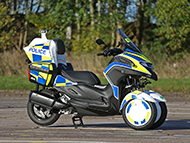From White Motorcycle Concepts Press Release
White Motorcycle Concepts [WMC] has unveiled its revolutionary new electric hybrid scooter – the WMC300FR. The bike is designed specifically for use as a fully operational first response vehicle that will help bring emergency services into line with new national objectives to combat the effects of climate change and cost reduction.
The pioneering British engineering company, founded by Chief Executive Officer Rob White and based in Northamptonshire, has based the WMC300FR on the same patented technology central to its all-electric WMC250EV high-speed demonstrator with which it intends to break the world electric land speed record over the next 12 months. In the case of First Responder however, the key objectives are not so much to achieve ultimate speed as to significantly increase range and viability while reducing CO2 footprint and running costs for emergency service fleets.
The three-wheeled scooter, developed in conjunction with Northamptonshire Police, and with the cooperation and guidance of the Northants force’s Chief Constable Nick Adderley – the Motorcycle Lead for UK Police – is the result of nearly three-year’s worth of research into pioneering drag reduction aerodynamics. This, paired with the latest generation of hybrid technology, can reduce carbon emissions by up to 50% of that of comparable conventional motorcycles and scooters.
The First Responder features WMC’s patented Venturi Duct, which reduces drag by pushing air through the vehicle, rather than around it. This system is aided by aerodynamic front fenders, which funnel the air towards the venturi, reducing overall frontal resistance and meaning less energy is required to propel the vehicle forward. The scooter is based on the Yamaha Tricity 300 and uses the same 292cc single-cylinder four-stroke motor, but the WMC300FR features hybrid power assist utilising two robust & proven 56V 12Ah detachable lithium ion batteries from industry leader – EGO Power+. These unique & innovative batteries can be fast charged in multiples of 6 from a standard three-pin plug, removing the need to wait during re-charge. Moreover, this feature ensures that the First Responder is ready to go into service long before the infrastructure is in place to cope with targeted legislation that will phase out all petrol and diesel-powered sales by 2030.
The First Responder’s up to 5kW power assist hybrid system works predominantly in the lower speed ranges of the vehicle, which improves acceleration and range and removes the need to use so much petrol until the venturi effect of the aerodynamics becomes prominent as the speed increases, maximising fuel saving.
Because of the minimum width between the two front wheels, the scooter can also be ridden with anyone holding a regular car drivers’ license (in most countries). In addition to the obvious ecological benefits for emergency service fleet managers to consider with the vehicle, this also significantly widens the accessibility to first responders, many of whom do not hold a motorcycle license.
Funded in part by government grants from the Office for Zero Emission Vehicles [OZEV], Advanced Propulsion Centre [APC] and Niche Vehicle Network [NVN], one of the most outstanding aspects of the WMC300FR First Responder is that it is a tangible example of the scheme paying back into the community through job creation, economic growth, tax savings and all while working towards a greener future.
Northants Police Chief Constable & UK Police lead for Motorcycles, Nick Adderley said: “COP26 showed that there is a will by all Governments around the World to reduce their CO2. We need to turn this will into action and lead by example. By adopting vehicles like the WMC300FR we are able to show the World what is possible and how innovation can be part of the solution for CO2 reduction without compromising our functional role in society.
As well as meet the green agenda we also need vehicles that are fit for purpose and what we see in the WMC300FR is one of the first vehicles that can achieve both these aims. We are only 2 fleet cycles away from having to meet the targets set by central government and so I am delighted that we have started those conversations now, with the WMC300FR.
As the national Police chief lead for motorcycling, it is incredible to have been involved in this project from the off, incorporating what we needed in a first responder vehicle. One of the things that I was really clear on in our initial discussions was that the motorcycle should have presence and stand out in our community Policing, provide accessibility to officers and be reflective of the professionalism the police service, the WMC300FR ticks all those boxes. I think that introducing the WMC300FR will make a real difference and I know that this will be welcomed by the police service.”
WMC CEO Rob White said: “We were encouraged by the great reception the launch of our WMC250EV high-speed demonstrator and the high level of interest that the project has subsequently gained. Whilst our concept in its most extreme form will help us go faster, its real-world application is all about improving range and reducing down time – major considerations in the electric vehicle industry at present.
“As the recent COP26 summit highlighted, we are still at the beginning of a revolution in aggressive carbon reduction and this global shift in thinking presents a unique opportunity to think radically about motorcycle design, finding the most efficient and cleanest way to power the future of transport. I am delighted to reveal our first product, the WMC300FR, which we have developed specifically for the first responder market. As well as the duct there are a whole host of innovative features that mean the motorcycle reduces CO2 by up to 50%. For us this is just the starting point and we will continue to innovate to accelerate the de-carbonisation of the automotive sector.”

